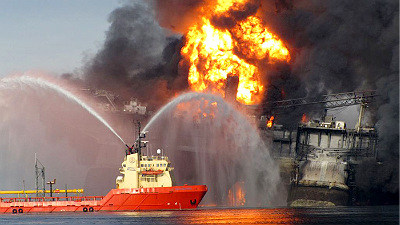How much blame does the Obama administration deserve for its handling of the BP oil spill? That’s been a little hard to get a firm handle on, but two recent pieces, one by Rolling Stone’s Tim Dickinson and another by McClatchy’s Steven Thomma, lay out the bill of particulars. First up, here are some excerpts from Dickinson’s piece that describe the three biggest issues:
-
Interior Secretary Ken Salazar didn’t clean up the Minerals Management Service aggressively enough: Scientists like [Rick] Steiner had urgently tried to alert Obama to the depth of the rot at MMS. “I talked to the transition team,” Steiner says. “I told them that MMS was a disaster and needed to be seriously reformed.”….”People are being
 really circumspect, not pointing the finger at Salazar and Obama,” says Rep. Raul Grijalva, who oversees the Interior Department as chair of the House subcommittee on public lands. “But the troublesome point is, the administration knew that it had this rot in the middle of the process on offshore drilling – yet it empowered an already discredited, disgraced agency to essentially be in charge.”
really circumspect, not pointing the finger at Salazar and Obama,” says Rep. Raul Grijalva, who oversees the Interior Department as chair of the House subcommittee on public lands. “But the troublesome point is, the administration knew that it had this rot in the middle of the process on offshore drilling – yet it empowered an already discredited, disgraced agency to essentially be in charge.” - The Obama administration allowed BP too much control: Instead of seizing the reins, the Obama administration cast itself in a supporting role, insisting that BP was responsible for cleaning up the mess. “When you say the company is responsible and the government has oversight,” a reporter asked Gibbs on May 3rd, “does that mean that the government is ultimately in charge of the cleanup?” Gibbs was blunt: “No,” he insisted, “the responsible party is BP.” In fact, the National Oil and Hazardous Substances Pollution Contingency Plan – the federal regulations that lay out the command-and-control responsibilities for cleaning up an oil spill – makes clear that an oil company like BP cannot be left in charge of such a serious disaster.
- The White House wasn’t transparent enough: From the start, the administration has seemed intent on allowing BP to operate in near-total secrecy. Much of what the public knows about the crisis it owes to Rep. Ed Markey, who chairs the House Subcommittee on Energy and the Environment. Under pressure from Markey, BP was forced to release footage of the gusher, admit that its early estimates put the leak as high as 14,000 barrels a day and post a live feed of its undersea operations on the Internet – video that administration officials had possessed from the earliest days of the disaster. “We cannot trust BP,” Markey said. “It’s clear they have been hiding the actual consequences of this spill.”
And here is Thomma’s summary of his own story, which describes not the administration’s reponse to the spill but its decision during the previous year to open up more offshore drilling sites. According to Thomma, the process was flawed:
- Obama thought that funneling information through White House “czars” such as energy and environment adviser Carol Browner would get him all the information he needed;
- He failed to drill into the government bureaucracy to test that information. He didn’t, for example, ask about the Interior Department’s Minerals Management Service, which in 2000 had prepared a report on the dangers of deepwater drilling that proved to be eerily predictive of what happened in the Gulf. The MMS regulates offshore drilling;
- He never talked to the Coast Guard about its 2002 oil spill drill in the Gulf, or to the man who ran it, Adm. Thad Allen, who later would oversee the response to the Deepwater Horizon spill.
- He didn’t reach out to outside experts, such as the National Academy of Engineering, to question claims that deepwater drilling technology was dependable.
The most compelling criticism, to me, is that given the monumental dysfunction within MMS Salazar should have been far more aggressive about cleaning up the agency. Beyond that, I’m just not sure. There are thousands of possible disasters waiting to happen in the world, and whenever one of them finally does happen you can dig up dozens of people who have been warning about it. So while it’s worth reading Dickinson’s piece to get the big picture of what happened, it’s also worth keeping in mind that prior to the Deepwater Horizon disaster the industry had gone 30 years without a platform blowout. There really was a good track record there.
Overall, I think my take so far is that the Obama administration isn’t especially culpable for the blowout itself and isn’t especially culpable for BP’s inability to cap the well. There’s just no magic bullet there. But the cleanup effort is another story. It’s early days yet, but my sense is that the Obama team really does seem to have dropped the ball here. They’ve trusted BP too much; they’ve interfered with both scientists and journalists trying to get a handle on what’s going on; and they still don’t seem to have a real handle on either the scope of the spill or how to respond to it. This isn’t the downfall of a presidency that conservatives are all gleefully anticipating, but it certainly feels like something Obama ought to have a better handle on by now.

















